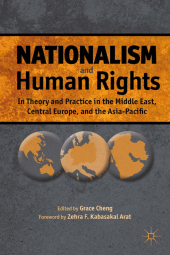 Neuerscheinungen 2012Stand: 2020-01-07 |
Schnellsuche
ISBN/Stichwort/Autor
|
Herderstraße 10
10625 Berlin
Tel.: 030 315 714 16
Fax 030 315 714 14
info@buchspektrum.de |

Zehra F. Kabasakal Arat, G. Cheng
(Beteiligte)
Nationalism and Human Rights
In Theory and Practice in the Middle East, Central Europe, and the Asia-Pacific
Mitarbeit: Arat, Zehra F. Kabasakal; Herausgegeben von Cheng, G.
1st ed. 2012. 2012. xii, 193 S. 216 mm
Verlag/Jahr: SPRINGER PALGRAVE MACMILLAN; PALGRAVE MACMILLAN US 2012
ISBN: 1-349-34157-6 (1349341576)
Neue ISBN: 978-1-349-34157-3 (9781349341573)
Preis und Lieferzeit: Bitte klicken
By critically addressing the tension between nationalism and human rights that is presumed in much of the existing literature, the essays in this volume confront the question of how we should construe human rights: as a normative challenge to the excesses of modernity, particularly those associated with the modern nation-state, or as an adjunct of globalization, with its attendant goal of constructing a universal civilization based on neoliberal economic principles and individual liberty.
Foreword; Z.Arat 1. The Relationship between Nationalism and Human Rights: An Introduction to the Dimensions of the Debate; G.Cheng 2. Human Rights as a Security Challenge: An Examination of Turkish Nationalist Discourse on Minority Rights Reformations; B.?.Tekin 3. All in the Name of Human Rights: Australian Nationalism and Multiculturalism, 1980-1990; T.Whitford 4. Migrants at Home: The Impact of Israeli Land Policy and Patrilocal Residence on Palestinian Women in Israel; L.Abou-Tabickh 5. National Rights, Minority Rights, and Ethnic Cleansing; O.Dahbour 6. Cosmopolitan Citizenship as a Thin Concept: Who is Willing to Die for Humanity?; F.Kartal 7. The Contradictions of Human Rights and Sovereignty: Contemporary Dilemmas of Postwar Historical Practice; G.Cheng 8. Taming the Nation-State: Human Rights and Peoples; M.Avila 9. Conclusion: Nationalism versus Human Rights; F.Türkmen
"David Brooks, the New York Times columnist, has written that no one wants to die for the United Nations or NATO, but persons are willing to die for their nation. This prevalent if incomplete truth highlights the tension between universal human rights and the evident tendency of many to give priority to national identity, national interests, and national sovereignty. While universal human rights have been regularly proclaimed and even legally codified since 1945, their actual enforcement often founders on the hard rock of narrow and exclusionary nationalism. This book addresses this conundrum with illuminating studies, highlighting how human rights, a project of the Enlightenment, are often violated due to a romantic conception of the nation. Despite its centrality, this clash has often been overlooked in human rights studies, and this book provides a useful step in correcting that omission."
David P. Forsythe, emeritus University Professor and Charles J. Mach Distinguished Professor of Political Science, University of Nebraska
"Nationalism and human rights are two of the most potent political ideologies of recent world history. Of the two, the idea of human rights has more prima facie legitimacy, while nationalism is overshadowed by its destructive excesses. Many have consequently concluded that nationalism and human rights are incompatible, and that the ´progressive´ cause is to reduce the influence of nationalism and to improve that of human rights. This volume of essays shows that the relations between the two ideologies are much more complex, both empirically and normatively, and the resolution of their relationship, both in theory and in practice, is very difficult. All those interested in nationalism and human rights and, regrettably, these two groups rarely overlap will find much valuable information and thought-provoking argument in this fine collection."
Michael Freeman, professor of Government, University of Essex
"Far from having ended militarism, ethnic exclusivism, and patriarchy, nationalism has exacerbated them in many post-colonial states. This wide-ranging set of essays helps us understand how the new witches´ brew influences universal human rights in Central Europe, the Middle East, and Asia."
Thomas G. Weiss, Presidential Professor of Political Science, The CUNY Graduate Center


